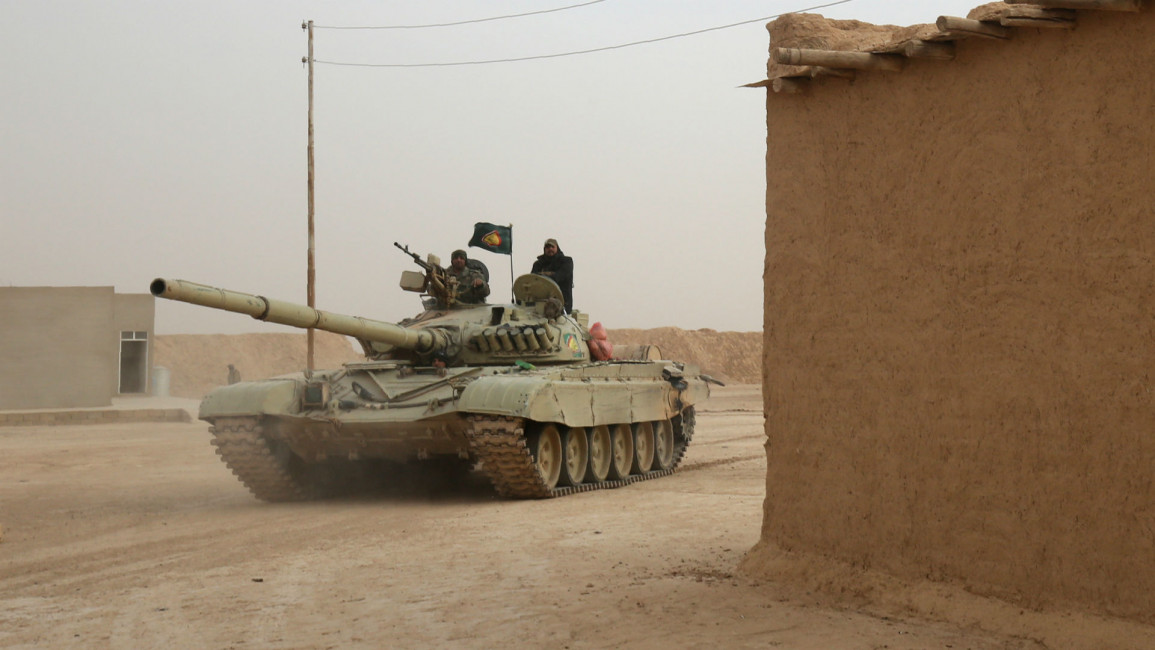IS massacred Iraqi men and boys following village uprising
IS massacred Iraqi men and boys following village uprising
At least 13 Iraqis were 'summarily executed' by IS fighters, after two villages rose up against the group and tried to expel the militants.
2 min read
Pro-Baghdad forces captured the villages shortly after the uprising [AFP]
At least 13 Iraqis - including two boys - were massacred by Islamic State group militants in October, after villagers attempted to expel fighters in northern Iraq.
The men and boys were killed following an attempted uprising in al-Lazzagah and al-Hudd when Iraqi security forces closed in, Human Rights Watch said.
Men allegedly involved in the uprising and civilians were shot dead or blown up by grenades, in killings described as "summary executions".
"[IS] responded to the village uprising by unlawfully executing people captured in the uprising and civilians who weren't involved," said Lama Fakih, deputy Middle East director at Human Rights Watch.
"Security forces who capture [IS] fighters should properly investigate their participation in alleged war crimes like these."
The two Iraqi villages have been under IS occupation since 2014 but were taken by Iraqi security forces in October 2016.
While the troops prepared to take the two villages, a group of men inside al-Lazzagah and al-Hudd gathered their arms and raised an Iraqi flag leading to an attempt to expel IS fighters.
A firefight broke out between some of the villagers and IS militants until ammunition ran out.
Four unarmed men hiding on a rooftop were killed when IS militants launched two grenades on the location, killing a 13-year-old boy, despite the pleas of his father to spare the child.
Others were also murdered without any form of legal recourse, while at least four were killed during a shoot-out with the militants.
A 19-year-old villager was shot dead by a sniper after celebrating the liberation of the villages by Iraqi security forces.
Human Rights Watch said villagers lived in constant fear of their lives under IS rule, with punishments such as death for smoking or using a mobile phone.
"After two years of [IS] abuses committed with complete impunity, Iraq's government has an opportunity to bring real justice to some of its victims," Fakih said.
"Prosecutors should give particular attention to [IS] war crimes committed against people who were forced to live under its control."
Iraqi security forces are currently trying to flush IS out of their stronghold of Mosul.
Despite speedy advances by Iraqi troops on the outskirts of Mosul in October, the advance slowed once the forces entered the city with faced stiff resistance from militants.
The men and boys were killed following an attempted uprising in al-Lazzagah and al-Hudd when Iraqi security forces closed in, Human Rights Watch said.
Men allegedly involved in the uprising and civilians were shot dead or blown up by grenades, in killings described as "summary executions".
"[IS] responded to the village uprising by unlawfully executing people captured in the uprising and civilians who weren't involved," said Lama Fakih, deputy Middle East director at Human Rights Watch.
"Security forces who capture [IS] fighters should properly investigate their participation in alleged war crimes like these."
The two Iraqi villages have been under IS occupation since 2014 but were taken by Iraqi security forces in October 2016.
While the troops prepared to take the two villages, a group of men inside al-Lazzagah and al-Hudd gathered their arms and raised an Iraqi flag leading to an attempt to expel IS fighters.
A firefight broke out between some of the villagers and IS militants until ammunition ran out.
Four unarmed men hiding on a rooftop were killed when IS militants launched two grenades on the location, killing a 13-year-old boy, despite the pleas of his father to spare the child.
Others were also murdered without any form of legal recourse, while at least four were killed during a shoot-out with the militants.
A 19-year-old villager was shot dead by a sniper after celebrating the liberation of the villages by Iraqi security forces.
Human Rights Watch said villagers lived in constant fear of their lives under IS rule, with punishments such as death for smoking or using a mobile phone.
"After two years of [IS] abuses committed with complete impunity, Iraq's government has an opportunity to bring real justice to some of its victims," Fakih said.
"Prosecutors should give particular attention to [IS] war crimes committed against people who were forced to live under its control."
Iraqi security forces are currently trying to flush IS out of their stronghold of Mosul.
Despite speedy advances by Iraqi troops on the outskirts of Mosul in October, the advance slowed once the forces entered the city with faced stiff resistance from militants.



